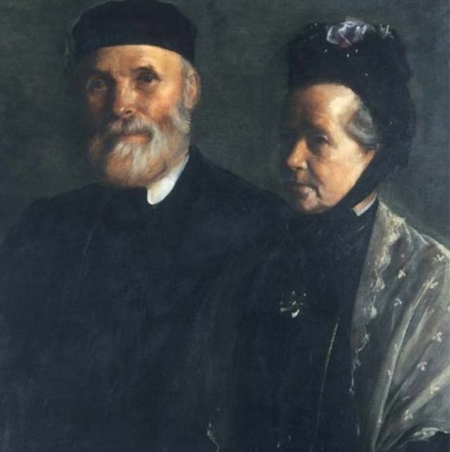

28 November 1922: Anna Haslam Irish campaigner for Women's Rights died on this day. Anna was born in Youghal, the 16th of 17 children of Jane and Abraham Fisher. The Fishers, Quaker merchants with extensive business interests in Youghal, were noted for charitable works, particularly during the Great Famine.
She was one the earliest campaigners for the Rights of Women in this Country. She was born Anna Maria Fisher in Youghal , Co Cork in 1829 into a family of Quakers. She met her husband Thomas Haslam when as a young adult she was teaching in Yorkshire, England. Thomas was also interested in political & social reform and hailed from Mountmellick, Co Laois. Anna and Thomas Haslam [above] married on 20 March 1854 in the Cork Registry Office. They had no children, perhaps by choice.
Anna and Thomas Haslam were founding members of the Dublin Women’s Suffrage Association (DWSA) in 1876. Though they were not practising Quakers they retained a deep commitment to the pursuit of political reform by exclusively peaceful methods. They engaged in a campaign of drawing room meetings from their Dublin home in Rathmines road and continuous letter writing to those public figures they believed could help to bring about votes for women and an improvement of their Status within Society. Anna could write up to 20 letters a day without difficulty. They also went to feminist meetings both in Ireland and England to lend support to like minded activists.
Success though was limited but not altogether without results as very slowly support grew for the concept that women should be allowed some say in the running of Public Affairs. The big breakthrough came with the Local Government Act 1898 which allowed women of property to sit on local councils. In 1903 she travelled to Holborn, London to attend a major conference on Women’s Rights. However by the early years of the century a more militant type of feminism was emerging and more violent and sensationalist method were espoused.
The Irish Women’s Franchise League (IWFL), a more militant organisation was formed in 1908. One of its founders Margaret Cousins recalled:
So a group of us went on November 6th to the dear old leader of the constitutional suffragettes. Mrs Anna Haslam, to inform her that we younger women were ready to start a new women’s suffrage society on militant lines. She regretted what she felt to be a duplication of effort’
Ireland’s Suffragettes by Sarah Beth Watkins
Hannah was getting on in years by then and younger more militant women were taking the reins from her. Her beloved husband died in 1917 and the political upheavals at home left her perplexed and confused as she saw Ireland’s future as best served by staying within the UK.
When she died in November 1922 the State was in the midst of a Civil War - her death un-noticed except by the faithful few. Today though her life and work along with that of her husband are commemorated by a stone seat in St Stephen’s Green Dublin.
No comments:
Post a Comment